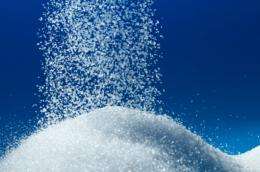Sugar fights still simmer as new brain study finds fructose might stimulate appetite

Fructose, a sugar much maligned in recent years, recently took another hit when a preliminary study by Yale University found that it might stimulate appetite more than other sugar types. The results came as no surprise to Robert Lustig, MD, a pediatric endocrinologist at the UCSF Benioff Children's Hospital who's made headlines for years with his public health crusade against excess sugar consumption.
In the Jan. 2 study published in the Journal of the American Medical Association (JAMA), researchers used magnetic resonance imaging (MRI) techniques to demonstrate that ingested fructose affects blood flow differently than glucose in the brainregions associated with feeding behavior, including the hippocampus and the striatum. The Yale researchers concluded that fructose consumption might be more likely to stimulate rather than curb appetite, similar to what was found in earlier animal research.
In fact, on average, the 20 normal-weight, young adults who participated in the study reported that hunger was sated by glucose, but not by fructose, although the study does not demonstrate that fructose causes obesity.
At UCSF, where many researchers and physicians are trying to understand obesity and its causes, Lustig stands out for his concern over the physiological effects of sugar consumption. He's also a strong advocate of policy changes that would lessen what he believes are sugar's contribution to the obesity epidemic in the United States.
Lustig, currently on a media tour for his new book "Fat Chance: Beating the Odds Against Sugar, Processed Food, Obesity, and Disease," said he would have been surprised if the Yale researchers had found no differences in the effect from sugar types.
"It's one more nail in the coffin" for the argument that fructose and glucose act the same, that calories count the same no matter where they come from, Lustig said.
Fructose in pure form is not in our diets
However, he noted, it would have been more relevant to compare sucrose to starch because people don't really eat pure fructose.
Sucrose is made up of equal parts glucose and fructose. High-fructose corn syrup is not much different than sucrose, as it contains roughly 55 percent fructose. Consumption of fructose in these forms has been trending upward for decades. The other main sugar in the diet is starch, made of glucose.
Lustig has long argued that table sugar is metabolized differently than starch. Controversially, he says research shows that insulin release triggered by sugar consumptions blocks signals sent by another hormone, leptin, and thereby fools our brains into thinking that we are not yet full.
Furthermore, according to Lustig, sugar consumption, like alcohol, is a major contributor to fatty liver disease, which has been on the rise.
The conclusion that elevated levels of insulin in the blood is a driver of obesity rather than simply a consequence of excessive weight gain—at least in mice—is shared by University of British Columbia researchers led by James Johnson, PhD, who found in a study published in the December 2012 issue of Cell Metabolism that mice genetically protected from rising insulin secretion with age also did not become obese. Fat cells in the mice genetically programmed to secrete less insulin burned more energy.
While Lustig's views remain controversial, his arguments are more widely heard than they might have been in years past. A YouTube video of one of his UCSF lectures, "Sugar: The Bitter Truth," has received more than 3 million views.
His arguments also have found an audience with some major politicians, including New York Mayor Michael Bloomberg, who has spearheaded a successful drive to ban restaurant and concession stand sales of sugary drinks bigger than 16 ounces. Earlier this month, in the United Kingdom – which has one of the highest child obesity rates in Europe – the health secretary of the opposition Labour party, Andy Burnham, made headlines by calling for a ban on the sale of breakfast cereals with more than 30 percent sugar.
In the U.S., where public support for even bedrock public health programs such as universal vaccination seems to be weakening – perhaps evidenced by recent upticks in the incidence of serious infectious diseases such a measles and whooping cough – Lustig is nonetheless ready to do battle. He is not one to be cowed by those who complain about "nanny state" regulations.
Lustig argues that a failure to address obesity and associated blood fat abnormalities, high blood pressure and insulin resistance – risk factors for heart disease and diabetes collectively known as the metabolic syndrome – will bankrupt Medicare in due time.
"There is no prevention of metabolic syndrome if we don't fix the food supply," he said.
Food calories might not all count the same
A decade ago, the "a calorie is a calorie" paradigm was firmly in place in the medical mainstream, and rarely challenged. Last week, along with the Yale study, JAMA prominently published an editorial by two Oregon Health Science University researchers that emphatically did challenge that paradigm:
"When results of studies manipulating a dietary element show adverse effects on food intake leading to increased body weight, a common counterargument is that it is the excess calories that are important, not the food. Simply put: just eat less. The reality, however, is that hunger and fullness are major determinants of how much humans eat, just as thirst determines how much humans drink."
More information:
jama.jamanetwork.com/article.a … px?articleid=1555133
www.cell.com/cell-metabolism/abstract/S1550-4131%2812%2900453-6


















